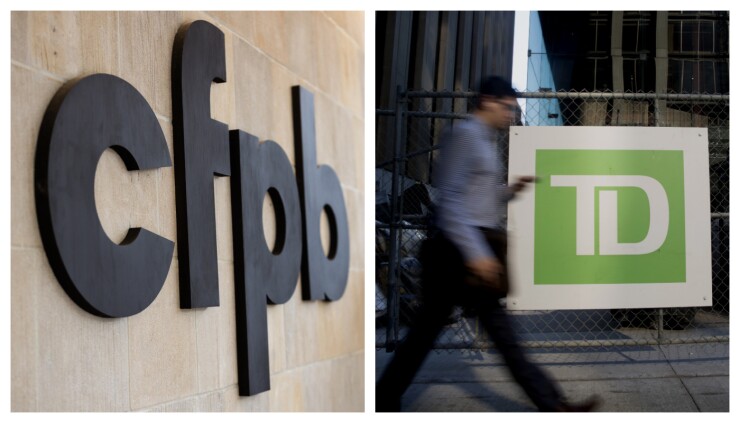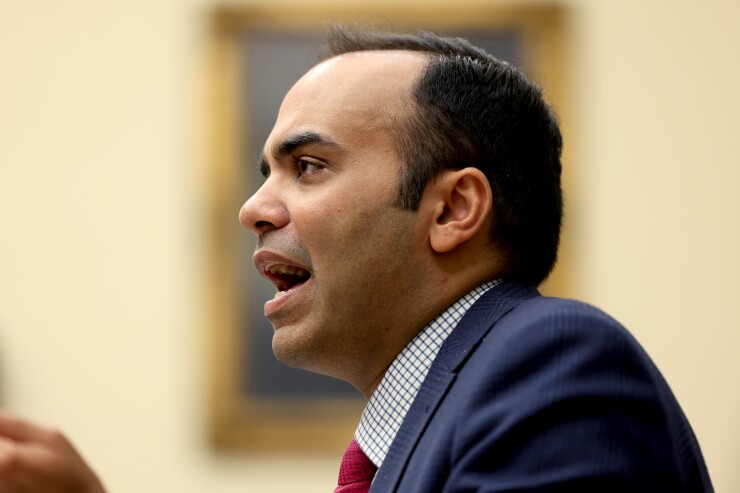
The Consumer Financial Protection Bureau has ordered TD Bank to pay $28 million for illegally tarnishing customers' credit and subsequently failing to rectify practices the bank knew to be botched.
TD entered into a consent agreement with the CFPB on Wednesday that says the bank gave false information to consumer reporting companies, sometimes knowingly, and lagged in remedying the failures once it was aware of them. The action comes as the U.S. subsidiary of Toronto-based TD Bank Group likely faces massive sanctions and fines from other U.S. regulators for separate anti-money-laundering failures.
The Cherry Hill, New Jersey-based bank neither admitted nor denied any wrongdoing related to the CFPB's claims, per the consent order. TD spokesperson Miranda Garrison said in an email that the bank "cooperated fully to resolve this matter."
"Long before this settlement, TD self-identified these matters and voluntarily and proactively implemented enhancements to our furnishing and dispute handling practices," Garrison said.
The CFPB said the bank's missteps impacted hundreds of thousands of customers.
"Regulators will need to focus major attention on TD Bank to change its course," CFPB Director Rohit Chopra said in a prepared statement Wednesday.
"The CFPB's investigation found that TD Bank illegally threatened the consumer reports of its customers with fraudulent information and then barely lifted a finger to fix it," Chopra said. "Rather than treating its customers fairly and following the law, TD Bank's management clearly cared more about growth and expanding its empire through mergers."
The $370 billion-asset bank's compliance problems have intensified in the last year, after it scuttled a planned acquisition of First Horizon that would have rapidly scaled its stateside presence. TD later disclosed that the Department of Justice was investigating its AML program, reportedly in connection with
While TD recently cautioned that it has

TD's alleged violations include sharing inaccurate data about credit card delinquencies and submitting bad information about certain accounts it had already confirmed or suspected to be fraudulent. The bureau claims TD's systems implied that certain accounts were open, even though they had been voluntarily closed by customers.
The bank's actions jeopardized the ability of "tens of thousands of consumers to access credit, housing and employment," the bureau said
The bank will be required to pay $20 million into the agency's piggy bank for victims of consumer financial protection law violations. The other $7.76 million is to be used to compensate impacted customers, each of whom will receive $150. Any of those funds that do not get disbursed to consumers will go to the CFPB.
The CFPB is also requiring TD to develop a compliance plan to address the bureau's claims, enhance its recordkeeping protocols for credit reporting and prepare a progress report for the CFPB.
TD's latest brush with the bureau follows a
The bank said at the time, in language similar to its statement Wednesday, that it had already "voluntarily and proactively" made changes to its disclosure and enrollment processes. Greg Braca, the U.S. banking unit's then-president and CEO, said TD disagreed with the bureau's conclusions but "cooperated fully."
During Chopra's tenure as head of the CFPB, he has repeatedly
TD, self-dubbed America's Most Convenient Bank, is still in the process of overhauling its AML program, but Bharat Masrani, the CEO of the bank's holding company,
Between an investment in AML compliance that has already cost $500 million, a price tag that will likely increase by hundreds of millions of dollars, and the $3 billion-plus in monetary penalties expected from U.S. regulators, TD could face one of the country's most expensive AML blunders. The bank has said that it knows where its risk management failed, and how to fix it, but it has been light on additional details.
Masrani said at a conference last week that TD is working to "deepen accountabilities" across functions, adding that it is "easy in a bank of our size to sometimes not look at accountabilities as clearly as we should."





